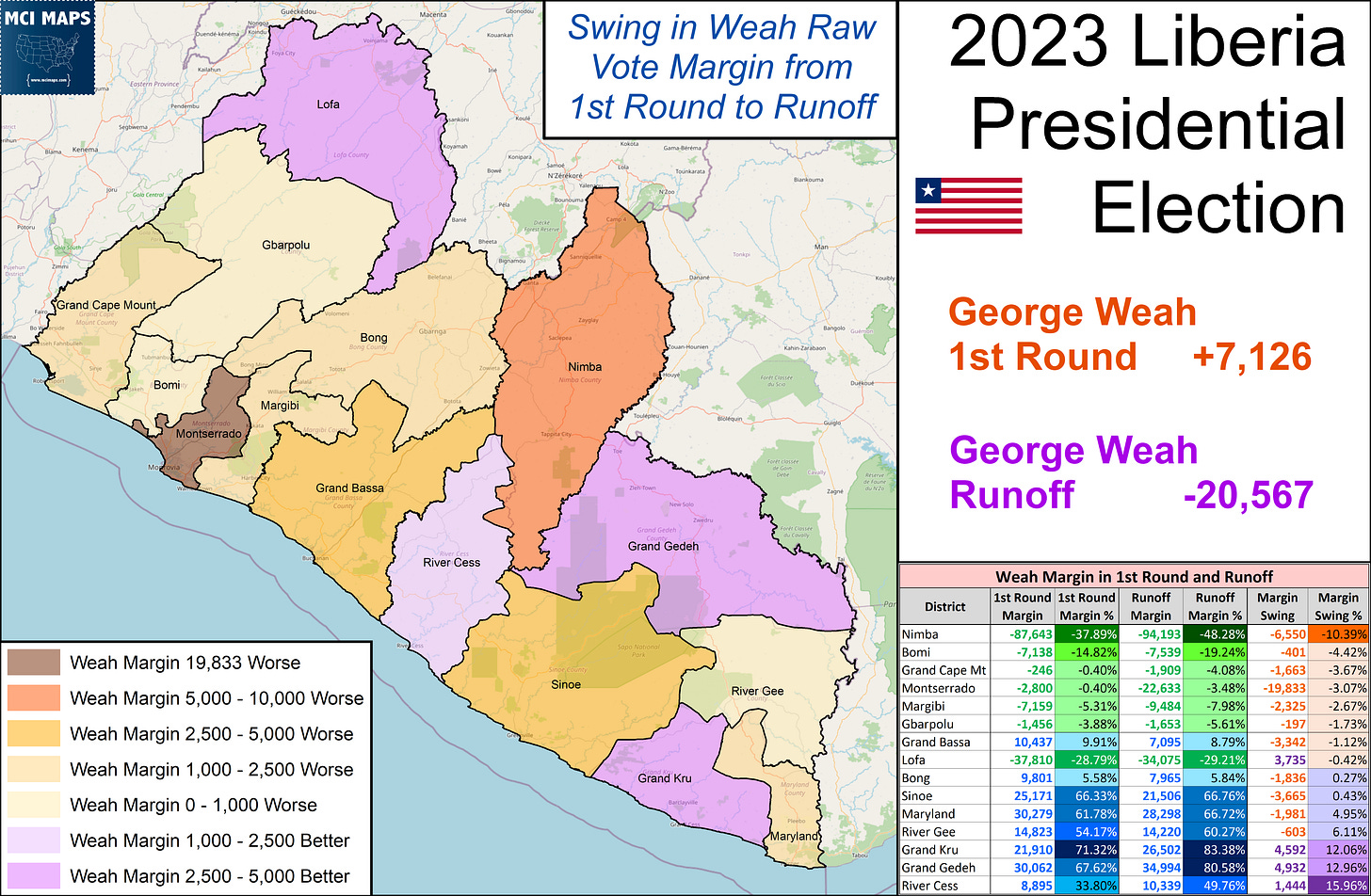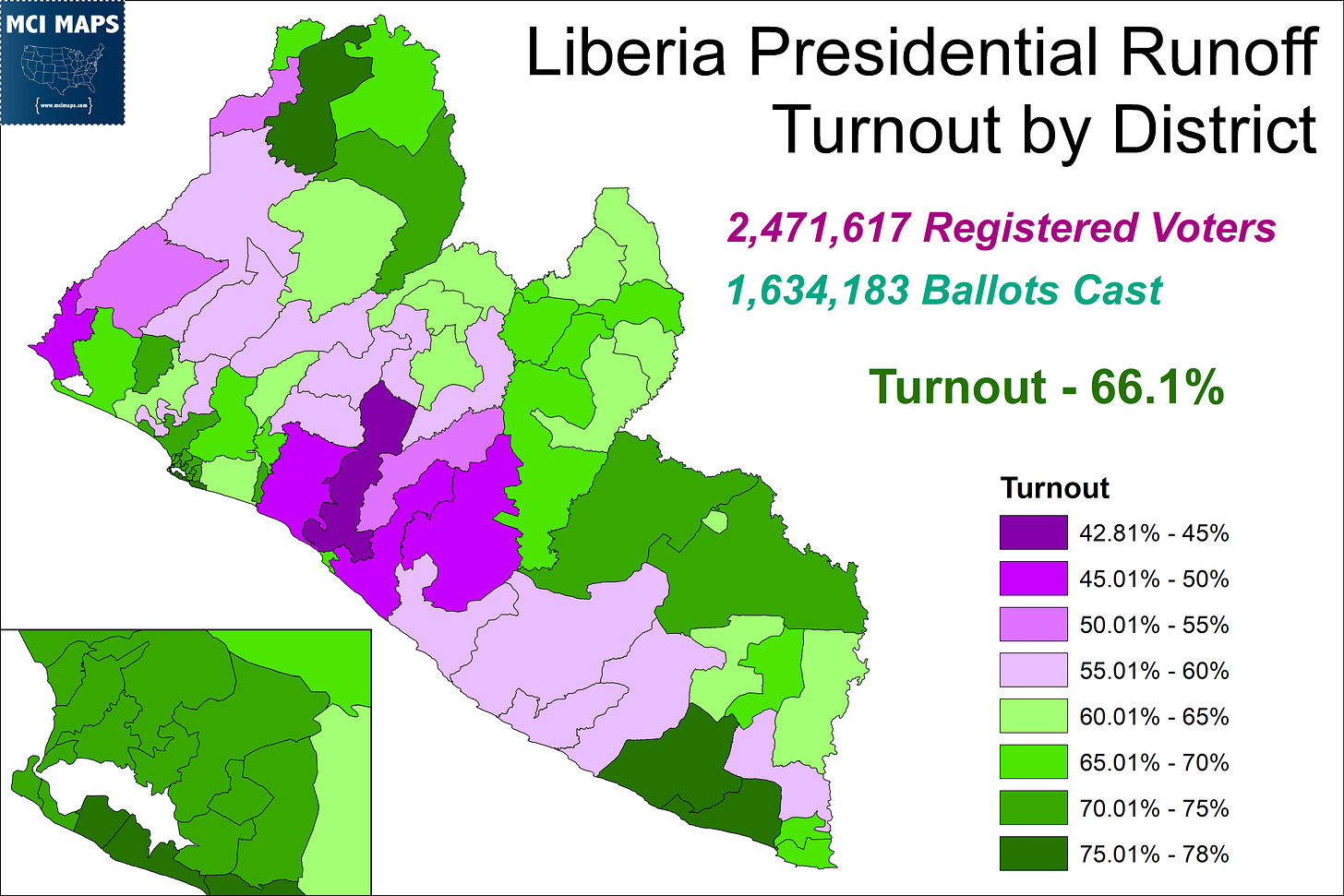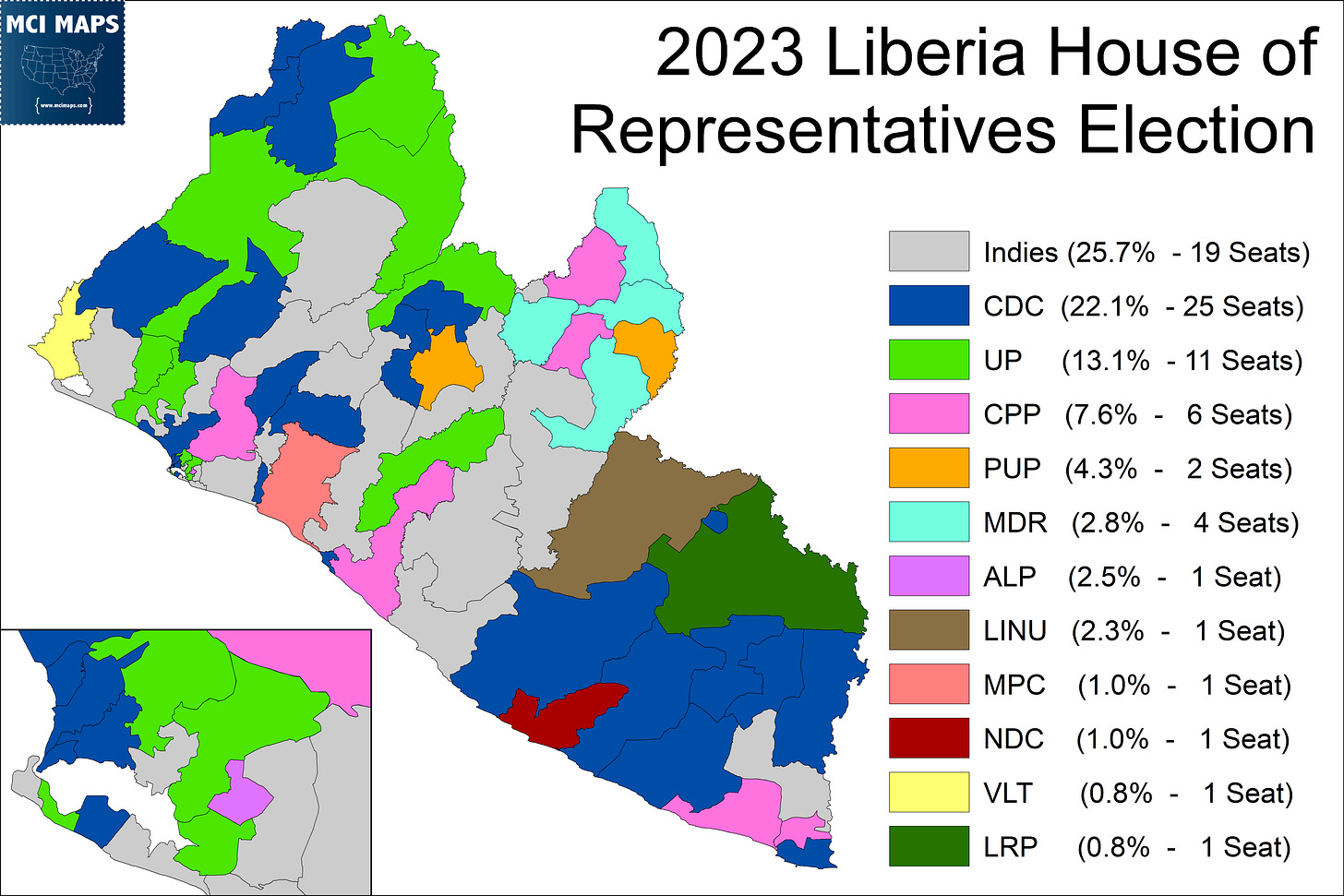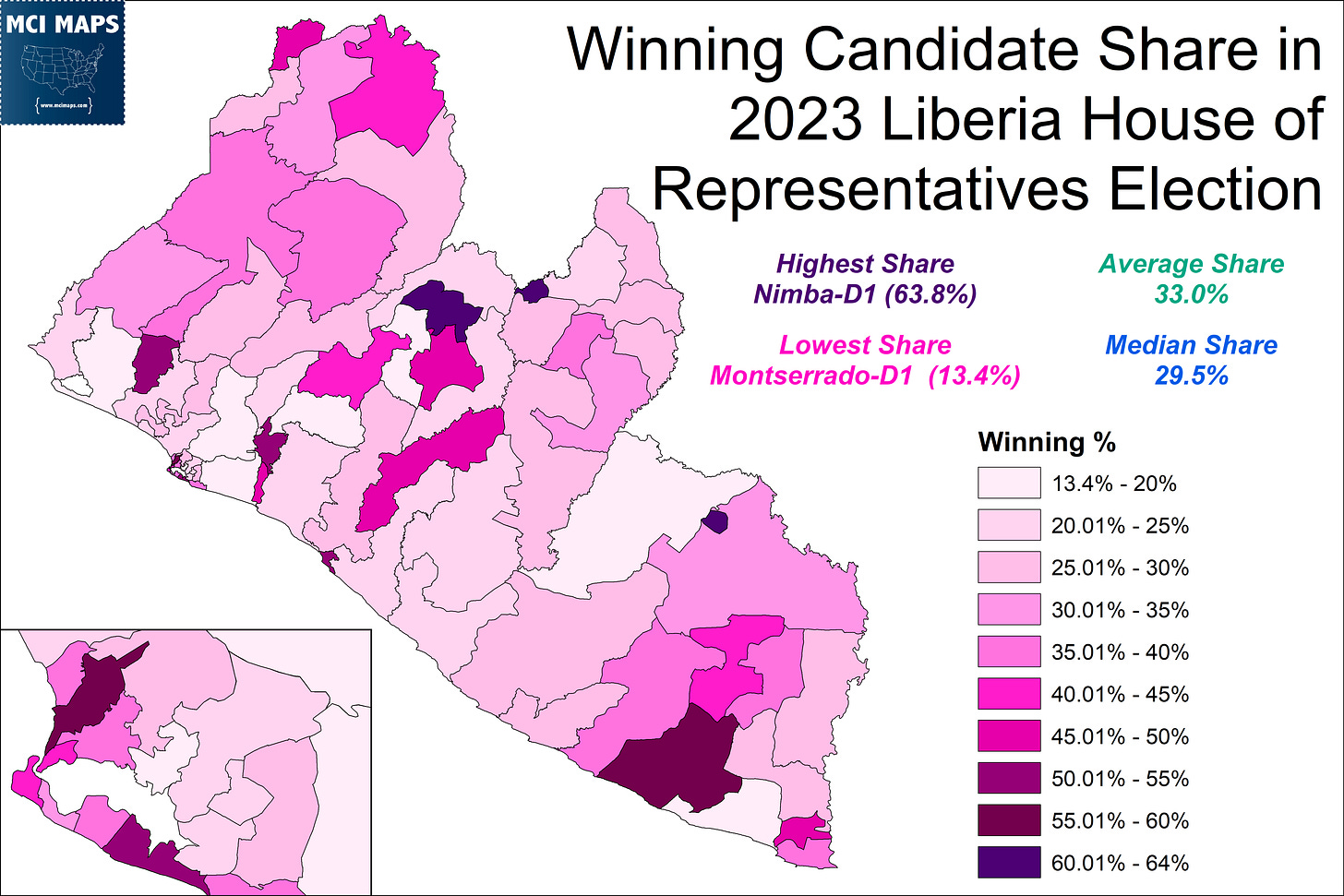Issue #147: Liberia's 2023 Presidential Election - A Historic Concession
An ousted President pledges to leave
In November of 2023, the east African nation of Liberia held its runoff election for President. The race saw Incumbent George Weah face off against his 2017 opponent, former Vice President Joseph Boakai. The race was critical for a nation that has been surrounded by countries facing election integrity questions and coups in just the last few years. Just several months ago, both Niger and Gabon faced coups, while neighboring Sierra Leone held a flawed and questionable Presidential election.
Read my article on the coup in Niger (staged by Russia against a Democratically-elected leader)
Read my article on the coup in Gabon (who actually was against a dictator who rigged his elections)
With Liberia having a long history of dictators, coups, and a civil war, many observers inside and outside the nation worried that the winter Presidential contest could see violent conflict or claims of fraud that would destabilize the nation. However, in an amazing shift in fortune for the region, these fears did not come to pass. Not only did Liberia hold successful elections, it saw a concession that will go down as one of the most critical moments in Liberia’s democratic history.
For these reasons, I want to discuss why this election was so critical for Liberia AND Eastern Africa.
Background in Liberia
I have actually written about Liberia before, so I don’t want to spend too much time repeating some of the history. I’ll offer here a short summary of Liberia’s history and coups and elections, but I highly recommend reading my post-2017 deep dive into the nations history.
Liberia History and Emerging Democracy Article
Liberia is likely known to most casual observers as the site of freed slaves in the early 1800s. Liberia was a key location for the “American Colonization Society”, which believed in re-settling slaves and freed black people back to Arica, rather than keeping them in America. This followed British efforts to re-locate their own black population to what is now Freetown in Sierra Leone. The American project set up colonies in what is now Monrovia in Liberia. The city was named after President James Monroe.
Liberia would become independent in the mid 1800s, with Sierra Leone remaining a colony of Britain for nearly another century. From independence and through the 20th century, Liberia was ruled by dictators. Elections were “held”, but they were infamous rigged or completely unopposed.
Despite this political repression, post-WWII Liberia would begin to rise on the world stage. The nation became a major source of rubber for the world and Dictator William Tubman, who’d been “elected” in 1943, worked to ensure the nation got a solid share of the profits. Tubman, who yes was a dictator that stifled dissent, did take efforts to ensure the rubber sales went to improving the Liberian economy. A deal with the Firestone Tire Company saw major investment in extraction efforts. The 1960s and 1970s under Tubman’s rule are known as the “Golden Age of Liberia” - which saw a growing standard of living.
Tubman would pass away in 1971 and was replaced by William Tolbert, who began to move for more political reforms. However, Tolbert would be assassinated in 1980 in his own bed by people aligned with Samuel Doe as riots over rising food prices griped the nation. Doe’s rise marked the big downward spiral for Liberal, as he used increasingly brutal and violent repression to hold onto power. In 1989, Doe was overthrown by warlords Prince Johnson and Charles Taylor; once allies of Doe. This was the First Liberian Civil War. Doe quickly lost control of the country and was assimilated by Johnson in the capital. However, before Johnson could truly assert control, Taylor managed to align most rebel forces around him, forcing Johnson into exile and making Taylor the new dictator.
Taylor’s rule in the 1990s was the stuff of horrors. The erratic and violent leader has been well parodied in Western media, most famously in LORD OF WAR. His allies would routinely use murder, mass rape, and child soldiers to keep dissidents in line. Through his repression and years of war, over 200,000 people (around 10 to 15% of the entire population) were killed!
Taylor was able to force peace in 1996 on his terms. In agreement for an end to violence, he was affirmed as the leader; pledging to run in a future election. At this point, peace was all that mattered for a vast majority of residents.
In 1997, Taylor won that promised Presidential election. While there was surely vote rigging, and Taylor did have supporters who had been oppressed by Doe, the main reason for voting for Taylor was the understanding that if he lost, he’d resume the war. Taylor would brag/mock this fact with a slogan “He Killed my Ma, he Killed my Pa, but I will vote for him.” The threat of violence worked.
Despite the threats, there were signs of opposition to Taylor. One notable opponent future President Ellen Johnson Sirleaf, who’d worked in the Tolbert government.
Taylor would eventually fall from power in the Second Liberian Civil War. Taylor’s attacks would never fully stop, and his enemies rallied against him. He also made the fateful decision to get involved in Sierra Leone’s Civil War, which further drew a bullseye on him. In 2003, he was ousted from power and forced into exile. I discuss this much more in my larger article.
Following the Taylor ousting, the UN helped set up Liberia with a transitional government and paved the way for the first true free and fair elections in the nation. Those elections, which saw a first round and runoff, would be won by Ellen Johnson Sirleaf. In the runoff, she would defeat former football star and future President George Weah himself. Again I delve far more into this in my main article. Sirleaf would win re-election in 2011, which I mapped out and discuss more on my main page.
While Weah would not win that 2005 contest, he would come back and win the 2017 race, defeating the term-limited Sirleaf’s Vice President, Joseph Boakai.
Weah’s win, which saw Boakai concede peacefully, marked the nation’s first peaceful and democratic transition of power in its history. Not only did Boakai concede, but Sirleaf made no effort to remain in power past the two-term limit.
That election was critical marker for the nation. That respect for Democratic institutions would be put to the test in 2023. Lets look at how Weah’s re-election campaign went.
The Weah Re-Election Campaign
While he’d won a landslide in 2017, Weah was clearly vulnerable heading into his re-election. However, the question emerged if he could truly be beaten at the end of the day. Joseph Boakai was was his main opponent again, but a total of 19 challengers filed against the incumbent President. That said, most were of little note. It was expected that either Weah or Boakai would win, with a runoff likely.
For Weah, his benefits were touting the major infrastructure projects he’d managed to complete, even with delays due to COVID. In a nation so wrecked by its civil war, basic infrastructure was a major issue. This included the construction of roads in areas where trails turn to un-passable mud during the rainy season. This issue can literally leave interior provinces cut off from the coastal capital. Weah got several projects done, with more pledged. New schools were built under his tenure and education was expanded. By no means was Weah’s term entirely a waste.
Going against Weah, however, was issues of rampant corruption. Several high-level officials had been hit by corruption allegations ranging from theft to favoritism. Issues around extrajudicial killings from rouge security have also demonstrated an issue with Weah’s ability to get the entire government in line. In a nation still reeling from its wars and dictatorships, Weah has struggled with this in a similar way than his predecessor did. Much of the population remains in poverty, with previous Weah backers declaring their disappointment in him for not cleaning up corruption that is stifling growth.
The Legacy of War and Generational Divides
Demographics also played a role in the campaign. Tribal groups did back different candidates, but by far the largest dividing line was age. Weah was/is more popular with younger voters, who have been emerging as the dominant electoral force. Over 60% of the population is under 30. This massive age gap makes sense considering how the Civil War and dictatorship saw an actual DROP in the Liberian population.
The wars of Charles Taylor were monstrous affairs which used child soldiers to carry out their atrocities. These child soldiers from the early 2000s are now young adults, part of Liberia’s Lost Generation - who try to grapple with civilian life and forgetting the past. This generation heavily favored Weah in both his past campaigns and to present day. Boakai, meanwhile, is much stronger with older voters, and viewed as a seasoned stateman. His age, 79, has been an issue on the campaign trail with younger voters, with it being viewed as an asset or disadvantage depending on who you ask. Weah is 57.
Both campaigns have a complicated legacy with the Charles Taylor regime and the wars. When Weah was elected in 2017, his VP was, and remained for this campaign, Jewel Taylor, the ex-wife of Charles Taylor. As I discussed in my 2017 article, due to the way information flows in the country, the Taylor myth/legacy still has backers; especially with the repressive Doe being largely vilified; making Taylor and Prince Johnson liberators to many. In a nation with still re-emerging education systems and mass media, local myths can dominate the image of different past leaders. However, Weah has been under increasing scrutiny for not backing a war-crimes court to bring to justice many of Taylor’s former leaders, who remain free in the nation. Others want the court so repentant soldiers can account for the past and move forward (like South Africa).
Meanwhile, Boakai aligned in the 2023 campaign with former warlord and now-Senator Prince Johnson (who if you see my 2017 article, will notice he ran for President before as well). Boakai, meanwhile, was a member for Samuel Doe’s cabinet, who does not have a positive historic reputation either.
How people views these ties can also vary. Were these candidates complicit in the war-crimes of the old regimes? Were they trying to keep a stable nation that granted had always been ruled by dictatorship? This is what voters had to grapple with.
The Election Results
As stated before, the expectation was that a runoff would be needed for this election. While Weah and Boakai were the only major candidates, it was believed Weah would struggle to secure 50% outright. Much of the analysis did expect Weah to lead in the first round of voting - buoyed by strong loyalty in the southern provinces. However, what came was the modest shock was how small Weah’s 1st round win was. The October vote saw Weah secure just a 8,000 vote lead over Boakai.
For Weah, the massive landslides he had in the southern provinces was not enough considering the low vote totals that come from there. He narrowly lost the Montserrado province, which holds around 40% of the likely votes. This is the home of the capital of Monrovia. One thing that hurt Weah in this round was how much the opposition coalesced around Boakai, with no province giving more than a few % to any other candidate. The total OTHER vote didn’t top 22% anywhere.
The narrow results of the first round showed that Weah was clearly at a real risk of losing his re-election. While both he and Boakai would work to secure the backing of the previous candidates, the other issue would turnout for the runoff. Both campaigns knew that a turnout drop was possible, and that what could matter most was the re-voting of their bases.
Heading into the runoff, the race seemed to be a clear tossup. Both candidates raced to get their dedicated backers out while also securing whatever support from eliminated candidates they could get. Then in November, the shock result came in - Joseph Boakai narrowly defeated George Weah.
Boakai secured just over 20,000 votes in his victory, a 1.2% margin. His win saw a very regionally divided country, but Boakai’s wins in provinces like Nimba and Montserrado elevated him over the incumbent; who’s massive margins in the less-populated south were not enough. Boakai’s 3% win in the heavily-populated Montserrado netted him 22,000 votes - more than the margin nationwide.
Further Win Analysis
There are two ways to look at the swing from the first round to see how Boakai pulled ahead of Weah. Looking at the swings in the provinces from percentage, it shows that Weah increased his domination in the south, but his losses in the more populated north doomed him.
Looking at this from a raw vote perspective, the problems for Weah are more apparent. In Montserrado, Weah did almost 20,000 votes worse than he had in the first round. That was with just a 3% swing against him.
Turnout dynamics also hurt Weah. Vote totals were down for the runoff, and in many Weah dominated provinces, it was way down. As a result, provinces like Sinoe, despite seeing a Weah margin increase, saw a smaller vote margin.
Below is the Presidential results by legislative district. This offers a more granular look, but also shows just how dominate candidates were in specific geographies. Its easy to cross many districts without every seeing the winner flip.
This map really highlights how Nimba stands out - with all its districts backing Boakai but being surrounded by Weah seats. This was the effect of Prince Johnson backing Boakai. Johnson is widely known as the kingmaker in Nimba, and an area he won in his Presidential runs. In the first round of voting, he was re-elected as Senator for Nimba easily. The backing if Johnson made Nimba a critical powerhouse for Boakai, with it holding the biggest swing for Boakai in the runoff.
Below is the turnout by district. There is not a strong correlation between turnout and candidate support, but there is a notable geographic divide, with Monrovia having strong turnout and the far inland strong as well. The middle districts, meanwhile, which are in more of the topical/rainforest climate, had weaker turnout.
I cannot say for sure, but that geographic divide may have been driven by infrastructure and ease of access, as discussed before. Also of note, in the first round, the total vote was 1.8 million; but in the runoff it was just 1.6 million, a 12% drop.
A Quick Look at the House of Representatives
I wanted to take a quick look at one other set of elections from Liberia; the House of Representatives contests. Liberia has an election system modeled after America, with a House and Senate. Senators are picked at the county/province level, while the House is elected by single-member districts.
While the Presidential contest was largely a race between Weah and his CDC Party and Boakai and the UP Party, the house results show many other parties winning seats. In fact, independents made up the largest share of the vote, 25%. However, the CDC leads in seats, with 25.
There is one notable issue with the Liberia House elections, however, there are no runoffs. Instead, the candidate with the most votes wins. However, a vast majority of these races featured many candidates. The average winning % was just 33%! The lowest was 13%!
Liberia used to have runoffs for these but voters approved an amendment to do away with them. The major driver was costs. Now again, for a poor nation still recovering from war, this is understandable. However, its hopeful this can change in the future. International aid groups should be offering funding to reverse this policy.
Just my take.
The Concession Speech
The Presidential results were razor close, far from an emphatic statement like the 2005 or 2017 runoffs. How did Weah respond? Did he try to question the results or delay any concession?
NO
Before even the final votes were tallied, but after it was clear he had no path to victory, President George Weah peacefully conceded to Joseph Boakai. He then took the radio to announce his concession and support for Boakai.
"A few moments ago, I spoke with president elect Joseph Boakai to congratulate him on his victory. I urge you to follow my example and accept the results of the elections."
The move was critical for short-circuiting any efforts to claim rigged voting from the losing camp; a not-uncommon occurrence in elections in the region. Both Weah and Boakai acknowledge the close result meant the nation was divided, but called or national unity. Since that moment, Weah has used his power as President to set up a formal transitional council for Boakai; who will be sworn in on January 22nd.
The Only Wholesome Democracy
The results stand in stark contrast to neighboring Sierra Leone, who’s June election is viewed as rigged. That race, despite taking place 6 months ago, still has not seen district-level results released. Even without formal results, partial data has shown statistically questionable numbers. The commission has insisted results will come, but that was months ago. In the meantime, the political situation is volatile, with a coup attempted being quashed last November, and several opposition politicians refusing to take their seats due to the questions about the rigged vote. As of this writing, any district-level results for President have not been released. I expect they never will be.
Compare this with Liberia, where in real time, you could watch returns coming in from the district level, precinct level, even ballot box level. The transparency was stunning! It was better there than many US States.
In this excellent article highlighting the difference between Liberia and Sierra Leone, political analyst Menipakei Dumoe lade it out perfectly
“Liberia is the only wholesome democracy in the Mano River Union, she has become the minority,” [Countries referenced are Liberia, Sierra Leone, Cote d’Ivoire, and Guinea]
Tragically this is true. I started 2023 excited about both Liberia and Sierra Leone, and if you read my June Sierra Leone preview, you will see that excitement. Tragically Sierra Leone’s Government let everyone down.
But Liberia has risen to an important challenge and passed with flying colors.














Having lived in both Sierra Leone and Liberia in the 70’s thank you so much for reviewing their history and for your in-depth interest in their experience with democracy.